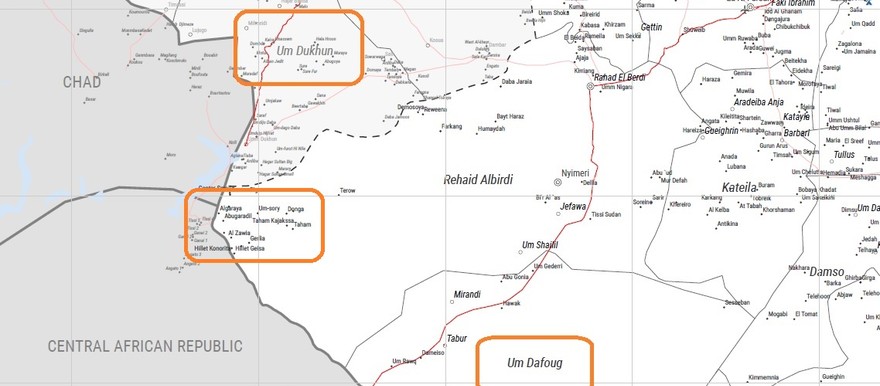‘Recurring clashes’ between Russian militia and gunmen along Sudan border spark security talks

Joint forces deployed in various areas at the border with the Central African Republic (OCHA map of South Darfur)
UM DUKHUN / N’DJAMENA –
On Saturday, pictures of dead Russians on the border between the Central African Republic (CAR), Chad, and Sudan, began to appear on social media.
A security expert, who preferred to remain anonymous, said that there have been “recurring clashes” between the Russian forces affiliated with the Russian Wagner militia and gunmen in the mining areas at the borders of the three countries. He warned that the situation could develop without giving any further details.
Sudanese people living on the border confirmed that Russian forces have been deployed widely along the western border of Sudan, in interviews with Radio Dabanga. Earlier this month, the Sudan News Agency (SUNA) reported that a large joint force of paramilitary Rapid Support Forces, army soldiers, and other Sudanese security forces was deployed to secure the border strip between Sudan and CAR on January 4.
The commander of the paramilitary Rapid Support Forces (RSF) and vice-president of the Sovereignty Council, Lt Gen Mohamed ‘Hemeti’ Dagalo, on January 2 accused unnamed Sudanese groups of mobilising their forces on the border with CAR as “part of efforts to create change in the neighbouring country.”
The commander of the Sudan Armed Forces and president of the Sovereignty Council, Lt Gen Abdelfattah El Burhan, has denied the involvement of any Sudanese party in clashes on the border.
Enhanced capacity
Sudan and Chad agreed on the urgent need to enhance the capacity of the countries’ joint forces on Sunday.
In the face of “increasingly frequent security challenges” along the border, El Burhan and Chadian President Mohamed Idris Deby met in N’Djamena to discuss sharing intelligence and information between the security services.
Both sides agreed on the need for strong and consistent action to contain irregular migration and arms smuggling. The two presidents also decided to hold a cross-border forum on security and development before the end of 2023 in Abeche.
The Presidents’ joint statement also addressed the need to activate the joint Sudan-CAR-Chad Tripartite Force that was established on January 18, 2005, in Khartoum to combat insecurity.
The two parties stressed the urgent need to complete the railway project and road infrastructure between Chad and Sudan as soon as possible to facilitate economic and commercial exchange.
Security tensions
Ashraf Abdelaziz, editor-in-chief of El Jareeda newspaper, told Radio Dabanga that El Burhan’s one-day visit to N’Djamena aimed to discuss mutual accusations about “certain forces” operating at the border.
He said that Hemeti will travel to Chad today to discuss security tensions and the role of the Rapid Support Forces in the border areas.
Abdelaziz said that it is important to note that Chad has made multiple statements over the past few years about being “surrounded by Russian mercenaries from all sides, especially along the borders of Sudan, Libya, and CAR.”
Wagner Group
The Wagner Group is a Russian paramilitary organisation, variously described as a private military company, a network of mercenaries, or a de facto private army of Russian President Vladimir Putin.
“The Hemeti-Wagner connection was at the heart of” Head of Military Intelligence, Mohamed Ali Subir’s, visit to Washington this month, according to an article by Antoine Galindo and Antoine Rolland in Africa Intelligence.
“By bringing [El Burhan] back into its fold, the US hopes to tip the balance of power between the junta leader and Hemeti in favour of the former.” According to the article, published on Thursday, an alliance with the Wagner Group “could guarantee the RSF access to several gold mines.”
Russian Wagner mercenaries, which reportedly have been present in South Darfur since 2021, have been accused of attacks on artisanal gold miners in Um Dafug locality, close to the border with CAR. The Darfur Bar Association (DBA) confirmed the presence of the mercenaries on June 24.
Radio Dabanga reported the presence of about 500 Russian soldiers who were received and hosted by the Sudanese government in a camp 15 kilometres south of Um Dafug in July 2018.
Historically, relations between Sudan and Russia have been steady. Omar Al Bashir met with President Vladimir Putin in 2017 and 2018 to invite more Russian companies to invest in Sudan. January 2019, Russia’s Ministry of Foreign Affairs confirmed that private Russian companies were training the army in Sudan.
A Sudanese delegation headed by the commander of the paramilitary Rapid Support Forces (RSF) and vice-president of the Sovereignty Council, Lt Gen Mohamed ‘Hemeti’ Dagalo, arrived in Moscow on February 23 last year, a day before Russia invaded Ukraine. According to political analyst Magdi El Gizouli, the visit to Russia was arranged by the Russian “Wagner mercenaries in order to find a way out for their ally in Sudan, and to ensure his continuation in power so that they can continue to plunder the country’s resources”.











 and then
and then